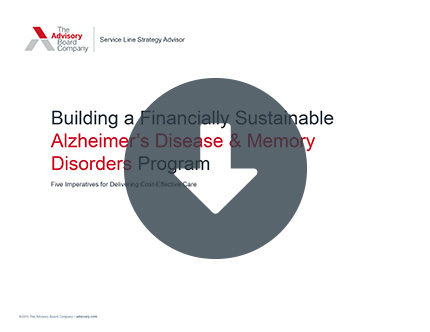Auto logout in seconds.
Continue LogoutFDA on Monday issued its first approval for a new Alzheimer's treatment in nearly two decades, giving a conditional green light to aducanumab, a Biogen drug that attacks the beta-amyloid proteins associated with Alzheimer's disease. But the approval comes amid significant controversy over whether the drug—which will be released under its brand name, Aduhelm—is actually effective.
Case studies: Keep Alzheimer's patients safe at home and in the community
Details on Aduhelm's approval process
Biogen launched two Phase 3 randomized controlled clinical trials on Aduhelm—but the trials were halted in March 2019, after independent monitors determined the drug was unlikely to benefit patients.
However, in October 2019, Biogen announced that it had conducted a new analysis of data from the trials. According to the updated analysis, a high dose of Aduhelm in one trial showed a small benefit in slowing cognitive decline, and in both trials Aduhelm was effective at removing beta-amyloid proteins.
The analysis also revealed significant side effects. Around 40% of participants receiving the higher dosage of Aduhelm developed brain swelling or bleeding, and around 6% of high-dose participants stopped taking the drug due to side effects. Further, one person died in an earlier safety trial after an adverse reaction.
Biogen submitted its analysis of the Phase 3 trials to seek FDA approval for the drug. Late last year, a panel of independent experts convened by FDA looked at Biogen's data. They determined there was not enough evidence to suggest the treatment had a significant benefit for patients, and they argued the drug should not be approved.

Building a financially sustainable Alzheimer's Disease & memory disorders program
However, FDA is not obliged to follow the panel's recommendations, and on Monday it decided to approve Aduhelm on a conditional basis—saying Biogen must conduct a large clinical trial in order to confirm that removing beta-amyloid proteins actually leads to cognitive benefits for patients.
If that trial fails, FDA could rescind the drug's approval.
"The data included in the applicant's submission [was] highly complex and left residual uncertainties regarding clinical benefit," Patrizia Cavazzoni, director of FDA's Center for Drug Evaluation and Research, wrote on FDA's website.
Regardless, FDA decided to approve the drug through accelerated approval, a process designed "to provide earlier access to potentially valuable therapies for patients with serious diseases where there is an unmet need, and where there is an expectation of clinical benefit despite some residual uncertainty regarding that benefit," according to FDA.
Biogen did not disclose how much Aduhelm, which will be administered as a monthly infusion, will cost. However, analysts expect it will be priced between $10,000 and $25,000 per year, STAT News reports. Although the drug was tested on only early-stage Alzheimer's patients confirmed to have beta-amyloid in their brains via PET scans, FDA's label for the drug does not impose similar restrictions; rather, the label says the drug is "for the treatment of Alzheimer's disease."
Reaction
Experts were divided on FDA's approval. Ronald Petersen, a neurologist who leads the Mayo Clinic Alzheimer's Disease Research Center, said he's "hopeful" for patients who qualify for the drug.
"Now we have a potential treatment for them that may modify the underlying disease course," he said. "But the largest responsibility for us is to educate patients and physicians as to what this means. This is not going to be penicillin for Alzheimer's disease."
However, some experts expressed concern about the approval, saying that—while it's clear Aduhelm reduces levels of beta-amyloid proteins—there's little evidence that it leads to an improvement in cognitive function.
G. Caleb Alexander, a member of FDA's advisory committee and an internist, epidemiologist, and drug safety and effectiveness expert at the Johns Hopkins Bloomberg School of Public Health, said prior to FDA's decision that an approval would "set a remarkably dangerous precedent—not only for the field of Alzheimer's research but also for the broader regulation of prescription drugs in our country" (Feuerstein/Garde, STAT News, 6/7; Belluck/Robbins, New York Times, 6/7; Belluck/Robbins, New York Times, 6/5; Herman, Axios, 6/7).
3 questions providers must ask themselves about Aduhelm’s approval
 By Nick Hula, senior analyst
By Nick Hula, senior analyst
This moment is undeniably historic, but not without controversy. In light of this controversy, I think it's helpful to define what this drug is, and what it is not.
Aduhelm is the first FDA-approved disease-modifying therapy for Alzheimer's disease–the sixth-leading cause of death in the United States. It will benefit certain patient early in their disease progression.
This drug is not a silver bullet. The FDA approval is conditional upon Biogen conducting a large post-approval, Phase 4 confirmatory study to prove Aduhelm's ability to slow cognitive decline in patients. The health care industry still has a long way to go to improve the lives of the millions of Americans living with this disease today and in the future. This is a starting point, not a finish line.
What does this mean for the future of Alzheimer's treatment?
This decision certainly provides a boost to the amyloid approach to Alzheimer's treatment, an approach that has met with repeated failures for more than a decade. Other drugs in the pipeline targeting this biomarker, such as Eli Lilly's Donanemab, can certainly expect a boost in their prospects after FDA approved Aduhelm for clearing a relatively low bar for clinical efficacy.
This approval also signals hope that the 2020s could be a historic decade for advancements in Alzheimer's treatment. Given the FDA's clear appetite for treatments, combined with the Biden administration's proposed funding for an Advanced Research Project Authority for Health and the industry's improving understanding of the disease's pathology, it's not unrealistic that we could have multiple disease-modifying therapies on the market by 2030.
What does this mean for providers?
This news should serve as a wake-up call for health care leaders across the country: We need greater investment in memory care.
In the days leading up to the FDA decision, much of the industry chatter revolved around the access barriers patients would face in event of approval. Put plainly, most provider organizations lack the infrastructure needed to capitalize on Aduhelm.
Providers should be asking themselves the following questions:
- Do we have the necessary infusion, imaging, and specialist capacity to meet increased demand?
Some markets won't have infusion capacity to satisfy the demand for Aduhelm right away. A RAND analysis estimated that average waiting times could even be as high as 18 months, during which some patients could deteriorate to the point that they are no longer eligible for the drug. Some organizations, such as Dent Neurological Institute, are already considering extending hours, adding infusion capacity, or building new infusion facilities over coming months to meet demand.
In addition, before a patient begin receiving Aduhelm, they must receive a PET scan to identify the presence of amyloid plaque, followed by regular MRI scans to monitor for side effects. This could strain imaging capacity and drive up total costs of care.
Finally, in many markets, demand for memory care already far surpasses supply. With the introduction of the Aduhelm, demand for diagnosis, treatment, and care management is set to skyrocket.
- Can we reach patients in an equitable manner?
Aduhelm's imaging and infusion capacity requirements create significant access barriers. Patients living in rural areas may be unable (or unwilling, given the drug's unclear clinical benefit) to drive or fly hours every month to clinics that can administer Aduhelm. Even individuals who live closer to care sites may not be able to find a loved one or caregiver who can take time off work to transport them on a regular basis.
Financial access will also be a concern. It is still unclear whether payers will be willing to cover the drug given the uncertainties around clinical benefit.
- Do we have a sustainable model for memory care?
From a financial perspective, the most successful organizations barely break even on memory care. The costs associated with managing Alzheimer's disease far outweigh potential revenue, even with the reimbursement associated with this new treatment. Organizations must improve their population health efforts and engage patients and their loved ones in reducing costly episodes of care such as falls and unnecessary ED visits.
Don't miss out on the latest Advisory Board insights
Create your free account to access 1 resource, including the latest research and webinars.
Want access without creating an account?
You have 1 free members-only resource remaining this month.
1 free members-only resources remaining
1 free members-only resources remaining
You've reached your limit of free insights
Become a member to access all of Advisory Board's resources, events, and experts
Never miss out on the latest innovative health care content tailored to you.
Benefits include:
You've reached your limit of free insights
Become a member to access all of Advisory Board's resources, events, and experts
Never miss out on the latest innovative health care content tailored to you.
Benefits include:
This content is available through your Curated Research partnership with Advisory Board. Click on ‘view this resource’ to read the full piece
Email ask@advisory.com to learn more
Click on ‘Become a Member’ to learn about the benefits of a Full-Access partnership with Advisory Board
Never miss out on the latest innovative health care content tailored to you.
Benefits Include:
This is for members only. Learn more.
Click on ‘Become a Member’ to learn about the benefits of a Full-Access partnership with Advisory Board
Never miss out on the latest innovative health care content tailored to you.
